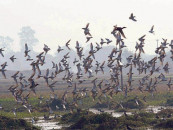Chocolate industry faces mounting supply threats from global warming: report
Coffee bushes are suffering from prolonged dry spells and unseasonal rains

Climate breakdown and biodiversity loss are exposing the European Union to mounting risks in its food supply chains, with cocoa imports at the heart of what experts have called a “chocolate crisis,” a new report said on Tuesday.
The analysis by UK-based consultancy Foresight Transitions found that more than two-thirds of key food imports into the EU in 2023 came from countries ill-prepared for climate change.
The study mapped Eurostat trade data against environmental readiness scores from the Notre Dame Global Adaptation Index and biodiversity rankings from the UK’s Natural History Museum.
It identified six key commodities – cocoa, coffee, soy, rice, wheat and maize – as particularly vulnerable.
Cocoa stood out as the most exposed. The EU sourced nearly 97% of its cocoa imports from countries with poor climate preparedness and 77% from nations with degraded biodiversity.
“These aren’t just abstract threats,” said Camilla Hyslop, lead author of the report. “They are already affecting prices, availability, and jobs — and it’s only getting worse.”
Most cocoa comes from West African nations, where rising temperatures, unpredictable rains, and biodiversity decline are combining to stress farming systems.
The report argued that large chocolate manufacturers should invest in climate adaptation and biodiversity protection — not just as a sustainability effort, but as a risk management strategy.
“This is not an act of altruism,” the report noted, “but a vital derisking exercise.” Ensuring fair prices for farmers, it added, would allow investment in climate resilience on the ground.
EU maize and wheat imports were also heavily reliant on countries with medium to low environmental readiness, according to the study. Maize was especially vulnerable, with 90% of imports coming from countries with poor climate scores.
Environmental experts warn the trend undermines the EU’s assumption of food security.
“This paints an extremely worrying picture,” said Paul Behrens, a food systems expert at the University of Oxford. “The EU likes to think of itself as self-sufficient, but the data show deep dependencies on fragile ecosystems abroad.”
The report, commissioned by the European Climate Foundation, also flagged concerns around coffee, soy and rice.
Uganda, for example, which supplied 10% of the EU’s coffee last year, scored low on climate readiness and biodiversity intactness.
Ugandan coffee farmer advocate Joseph Nkandu called for increased access to international climate finance to help smallholders cope with erratic weather patterns.
“The weather in Uganda is no longer predictable,” he said. “Our coffee bushes are suffering from prolonged dry spells and unseasonal rains.”
Oxford researcher Marco Springmann, who was not involved in the report, said deeper reform of food systems was needed.
“Resilience isn't just about stabilising current supply chains,” he said. “We also need to move away from overreliance on crops like soy, which are primarily used to feed livestock.”























COMMENTS
Comments are moderated and generally will be posted if they are on-topic and not abusive.
For more information, please see our Comments FAQ